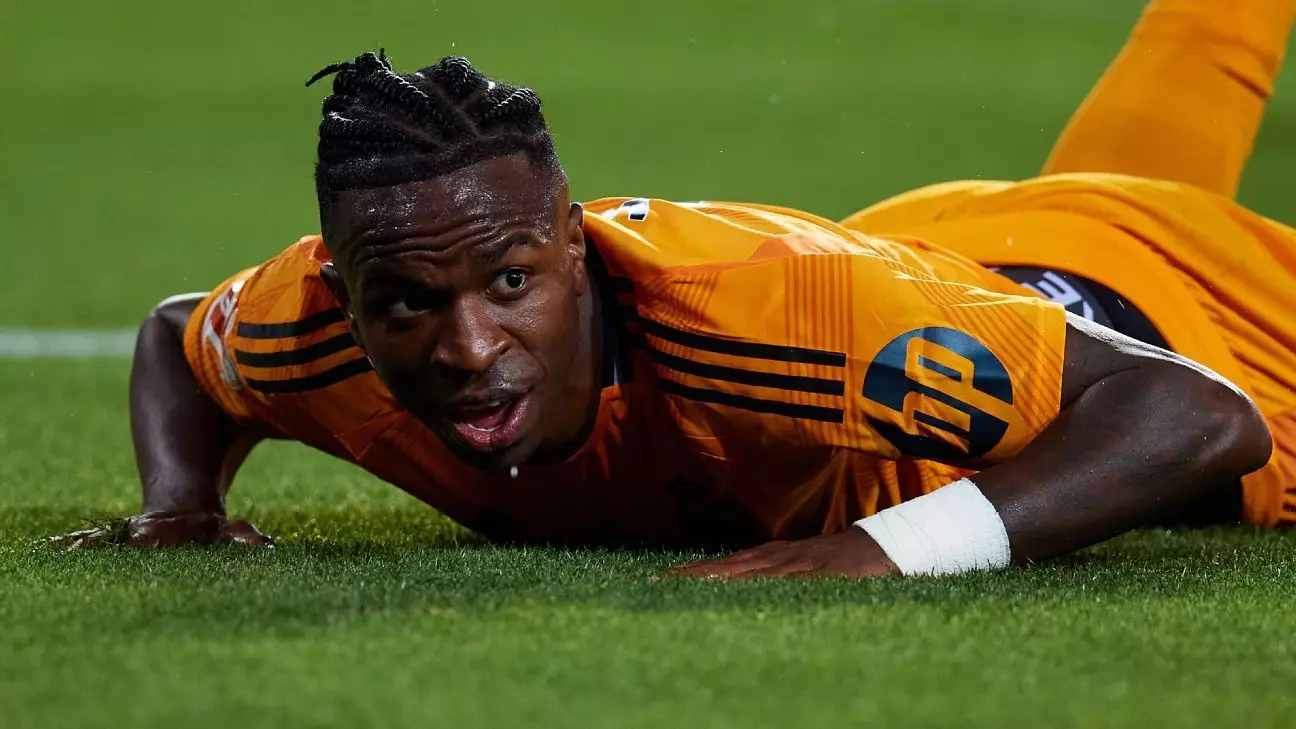Vinicius Junior, a name that resonates in the corridors of global football, has recently faced scrutiny regarding his conduct on the pitch. This scrutiny not only questions his talent but also encapsulates larger discussions about race, media perception, and the standards we impose on athletes. In analyzing Vinicius’s situation, we arrive at an intersection of admiration for his skills and concern for the challenges he faces, both on and off the pitch.
Vinicius’s recent red card during a match against Valencia has become the talk of Spanish football. While his expulsion might seem justified given the circumstances, it opens the door to an examination of how society reacts to players like him. With two red cards in nearly 300 matches, one could argue that he is far from a liability. In fact, this statistic is dwarfed when compared to legendary players like Sergio Ramos, who was dismissed ten times by his mid-twenties. Yet, Ramos’s career was often framed through a lens of acceptance and understanding, allowing room for his aggressive play. In contrast, Vinicius is labeled as immature and overly emotional, revealing a stark contrast in media narratives when race and ethnicity enter the equation.
Vinicius’s conduct can arguably be attributed to provocation. His red card arose from a reaction to a negative stimulus, which is a common occurrence in competitive sports. However, the difference in treatment from the media becomes apparent when considering that players of different backgrounds receive different levels of empathy for similar actions. While Ramos was excused for his fiery demeanor, Vinicius’s emotions have been framed as a significant red flag in his conduct as a professional athlete.
The distinct reactions to both players’ actions pose an interesting query regarding societal and media expectations of athletes. It is not merely Vinicius’s actions on the pitch that matter; it is how those actions are discussed. Post-incident, the media analysis often frames Vinicius as someone who needs to “grow up,” while discussions around Ramos frequently highlight the fierce passion and tenacity that characterize his style of play.
The implications of race in these discussions cannot be overstated. Ramos, a white Spanish player, has enjoyed a shield of acceptance even in the face of repeated infractions, while Vinicius, a Brazilian of African descent, contends with both doubts about his emotional control and scrutiny about his background. This discrepancy raises essential questions regarding how narratives around athletes are crafted, who is given leeway and why, and how social identity shapes public perception.
Real Madrid, as Vinicius’s club, also bears some responsibility for the atmosphere surrounding his career. The pressure to perform, coupled with the incessant media critique, has undoubtedly contributed to an environment potentially conducive to emotional outbursts. While Carlo Ancelotti asserts that Vinicius has made improvements in controlling his reactions, the circumspection from fans and the media draws attention to the need for holistic support systems for players like him.
The club’s management practices, including how they respond to disciplinary matters publicly, may inadvertently amplify the pressures faced by Vinicius. Comments made by media contributors associated with the club suggest a stoking of outrage rather than an encouragement of a calm, measured response. This partisan framing can only heighten a player’s sense of paranoia and anxiety, making it even more difficult to navigate provocative situations in matches.
Ultimately, the focus should remain on the amazing talent that Vinicius possesses. His capacity to influence games, with contributions nearing 180 goals and assists in less than 300 matches, speaks volumes about his potential. Instead of scrutinizing his every misstep, a more supportive approach could foster individual growth, allowing him to harness his passion without the fear of inciting backlash.
As fans, pundits, and clubs alike navigate the narrative surrounding Vinicius, we must challenge ourselves to create a more inclusive atmosphere that acknowledges the merits of all players. Discrepancies based on race or background must be addressed to promote fairness in the discourse about athlete behavior. Recognizing the unique pressures faced by diverse players not only enriches the sporting conversation but also ensures that talent can flourish without the shadows of undue criticism stifling potential.
Vinicius Junior embodies a deeper narrative: one that goes beyond mere athletic prowess. He represents the intricate weave of identity, challenges, and public perception that modern athletes must navigate, all while being expected to perform at the highest level. The conversation around him must evolve from condemnation to understanding, championing the joy and excitement he brings to the beautiful game.

